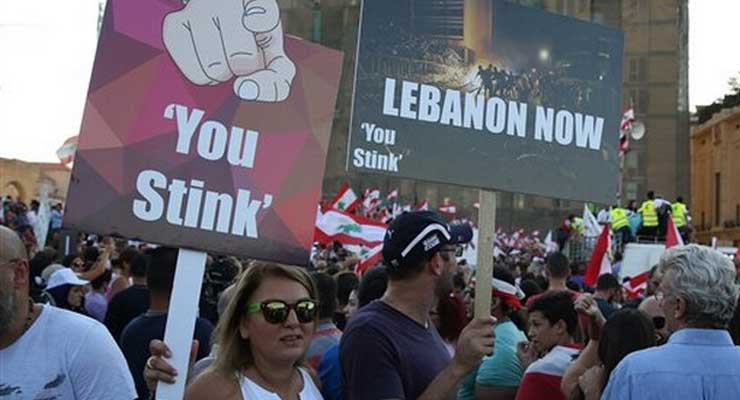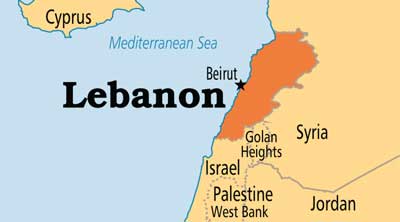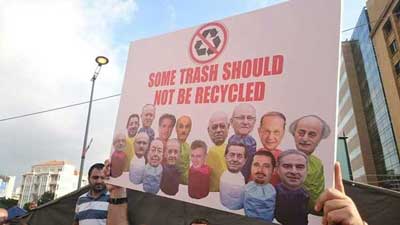
The last round of municipal elections in Lebanon took place over six years ago.
Since then, the amplification of preexisting Iran-Saudi tensions has dominated the political climate of Lebanon, leading to Saudi Arabia suspending $4 billion in military aid and Iran demanding pro-March 8 Alliance militias to intensify backlash against Saudi forces in Syria. But despite the fact that the last six years of political discourse has centered primarily on this underlying battle for power between the Middle East’s main rivaling countries, there has recently been a surprising upswing in attention on new issues driven by new forms of politicized energy. Interestingly, this new attention is a diversion from the traditional, polarizing discussion on the Iran-Saudi conflict that is represented by the two opposing Lebanese coalitions consisting of factions led by established political parties and time-honored politicians. In this way, the emphasis on new concerns is an insurgency aiming to conquer the political future of Lebanon with more long-lasting, observable change.
 But looking to the past for a moment, the launch of a revolution in Lebanese political conversation can be traced to a series of charged protests that had been initiated in 2015 by the grassroots organization ‘You Stink,’ which aims at creating a social movement based on the incompetence of the Lebanese government in many of its failed endeavors. Interestingly, despite focusing on a wide array of failures, including political stagnation, power and water shortages, and inefficient urban infrastructure, it has seen success by concentrating on one of the Lebanese government’s latest and most noticeable failures — its inability to deal with the trash crisis caused by the closure of the country’s biggest waste dumps. While this waste disaster has indeed resulted in rubbish overflowing onto streets, it has more importantly yielded a visibly disgruntled population with the tangible evidence of trash serving as both a reminder of the Lebanese government’s failures and a symbol of the Lebanese government itself.
But looking to the past for a moment, the launch of a revolution in Lebanese political conversation can be traced to a series of charged protests that had been initiated in 2015 by the grassroots organization ‘You Stink,’ which aims at creating a social movement based on the incompetence of the Lebanese government in many of its failed endeavors. Interestingly, despite focusing on a wide array of failures, including political stagnation, power and water shortages, and inefficient urban infrastructure, it has seen success by concentrating on one of the Lebanese government’s latest and most noticeable failures — its inability to deal with the trash crisis caused by the closure of the country’s biggest waste dumps. While this waste disaster has indeed resulted in rubbish overflowing onto streets, it has more importantly yielded a visibly disgruntled population with the tangible evidence of trash serving as both a reminder of the Lebanese government’s failures and a symbol of the Lebanese government itself.
Interestingly, from this energy brought on by the onslaught of protests that began in 2015, a political environment has been created that is exquisitely suitable for the emergence of Beirut Madinati (Beirut My City), which is a volunteer-led political campaign that officially took off in April of 2016. The goals of this group were clear from the start: to run and win in the 2016 Beirut municipal elections, starting with the first of four rounds of elections that were held on May 8. This first round is particularly significant, as it marks the first time since the Syrian Civil War that the Lebanese citizenry is able to employ their political influence.
Since the Lebanese Civil War, the municipal elections have normally been uninteresting and uncompetitive. But because Lebanese politicians have repeatedly deferred parliamentary elections that were originally scheduled to take place in 2013, as well as the overall political impasse at the national level that has resulted in failure to elect a president, municipal elections are all that the Lebanese people have left in their desire to create a democratic political modicum centered on accountability and political change.
 Historically, members of established political families connected with national sectarian parties are able to win municipal elections in Lebanon without much effort, and certainly without promoting specific agendas tailored to the needs of the Lebanese people. But that all changes with Beirut Madinati and its list of independent candidates, who tend to be of non-political background, from engineering and art to academia and activism, and are equally split between both genders and across most of Lebanon’s diverse sects of religion. The group centers around a passionate grassroots campaign, as Beirut Madinati has relied on individual donations and volunteer efforts fueled by the people to promote a simple agenda that focuses on public good, social justice, and transparency.
Historically, members of established political families connected with national sectarian parties are able to win municipal elections in Lebanon without much effort, and certainly without promoting specific agendas tailored to the needs of the Lebanese people. But that all changes with Beirut Madinati and its list of independent candidates, who tend to be of non-political background, from engineering and art to academia and activism, and are equally split between both genders and across most of Lebanon’s diverse sects of religion. The group centers around a passionate grassroots campaign, as Beirut Madinati has relied on individual donations and volunteer efforts fueled by the people to promote a simple agenda that focuses on public good, social justice, and transparency.
In fact, its operation is built around the following 10-point message that regards areas of concern it would like to advance: political mobility, greenery in public space, natural heritage, environmental sustainability, affordable housing, waste management, vital community services, socioeconomic development, health disparities, and effective municipal governance. This 10-point message, while simple, is meaningful because it is spurred by a unifying, populist energy based purely on profound messaging, unlike the broad divisions and focus on popular personalities that traditionally exempts politicians from true discussion on pressing domestic issues.
After a long wait to investigate possible fraudulent voting behavior and to verify votes, the results of the May 8 election are officially in, and although Beirut Madinati lost to the bipartisan “Beirutis” list of established candidates from both sides of the aisle and which former Prime Minister Saad Hariri endorses, the Beirut Madinati list has been able to win over 40 percent of the overall vote. Given that the elections have heavy voting restrictions forcing voters to vote in their hometown of origin, as well as conventional unanimous support for established names and a relatively short period of time for the insurgent campaign to strike, such a gigantic percentage of support is profound. Even more impressive, Beirut Madinati received more than 50 percent of the vote in the Christian district of Achrafieh, and more than a third of the Sunni vote, which is particularly startling given the Sunni community’s almost unanimous support for Hariri and their history of listening closely to his endorsements.
But, unfortunately, this high percentage of public support has not translated into victory in acquiring even one governmental seat for the movement. Yet perhaps more important than the actual loss, the movement has won over social media and the Lebanese youth, which has effectively exploded in excitement and with great enthusiasm to partake in further steps that will progress the movement. And if viewed with a pragmatic outlook, Beirut Madinati has, at the very least, been victorious in influencing the establishment to adopt their platform, and has even forced establishment candidates to borrow progressive ideas, pushing the ruling class towards embracing a definitive plan for social action.
Regardless of the actual defeat in the municipal elections, Beirut Madinati and its populist backings have proved that the Lebanese people’s frustration can be legitimately channeled to navigate Lebanon’s failing political system from within. The political mobilization that results, while ultimately not effective at sparking institutional change instantaneously, will certainly continue for years to come. And while the attempt to deteriorate power away from established ruling elites is difficult, no matter how gentle or measured the changes are, Beirut’s latest social movement is evidence that political talk and campaigns can be revolutionary: in Lebanon specifically, they have allowed an earnest discourse on the everyday concerns of the people rather than on traditional global conflicts that the establishment engages simply to avoid confronting more meaningful dialogue.
Leave a Reply